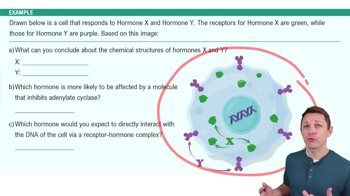Here are the essential concepts you must grasp in order to answer the question correctly.
Electrolytes
Electrolytes are minerals in the body that carry an electric charge, essential for various physiological functions. They help regulate nerve and muscle function, hydrate the body, balance blood acidity and pressure, and rebuild damaged tissue. Common electrolytes include sodium, potassium, calcium, magnesium, chloride, bicarbonate, and phosphate.
Recommended video:
Introduction to Blood Example 2
Fluid Compartments
The body is divided into different fluid compartments: plasma (the liquid component of blood), interstitial fluid (the fluid between cells), and intracellular fluid (the fluid within cells). Each compartment has a distinct composition of electrolytes, which is crucial for maintaining homeostasis and facilitating cellular processes. Understanding these compartments helps in grasping how electrolytes function in the body.
Recommended video:
Intracellular Fluid
Intracellular fluid (ICF) is the fluid found inside cells, making up about two-thirds of the total body water. It is rich in potassium and phosphate ions, which are vital for cellular metabolism and function. The balance of electrolytes within the ICF is crucial for processes such as energy production, protein synthesis, and maintaining cell structure.
Recommended video:
Intracellular Receptors and Direct Gene Action Example 1
 Elaine N. Marieb, Katja Hoehn 7th Edition
Elaine N. Marieb, Katja Hoehn 7th Edition Ch. 26 Fluid, Electrolyte, and Acid-Base Balance
Ch. 26 Fluid, Electrolyte, and Acid-Base Balance Problem 2
Problem 2 Verified step by step guidance
Verified step by step guidance


